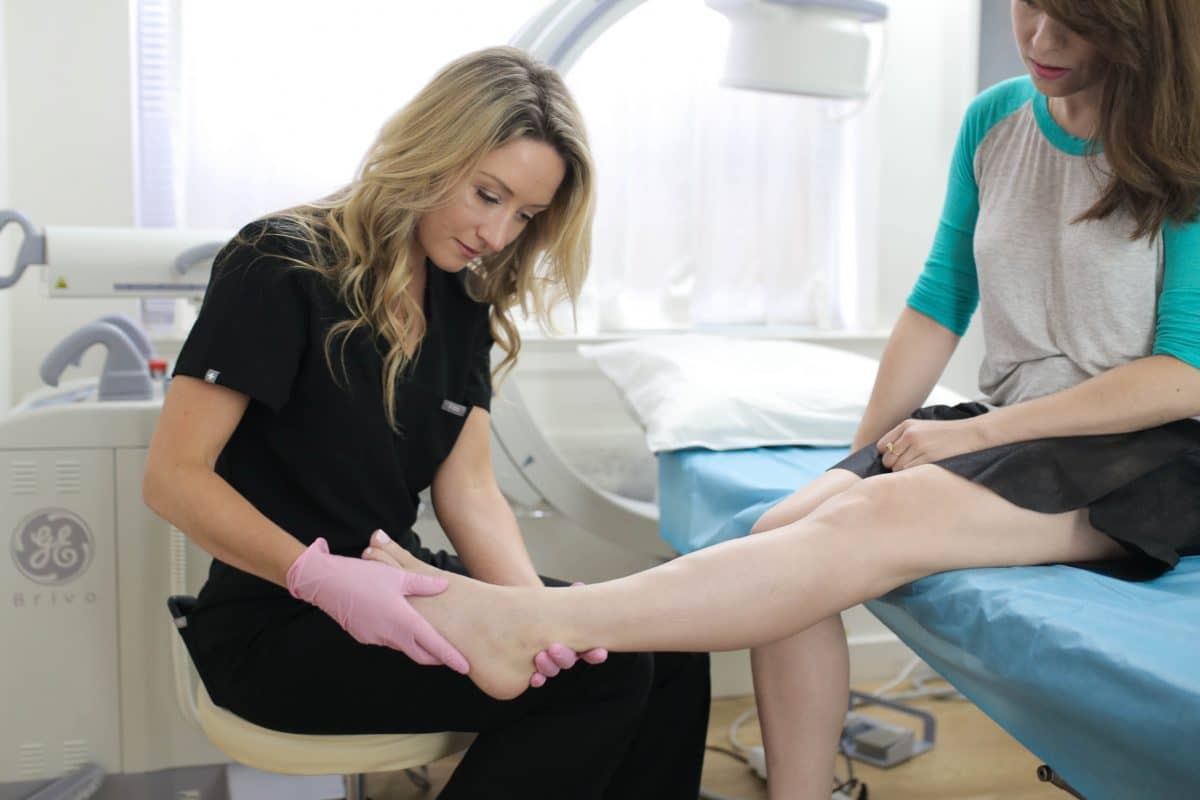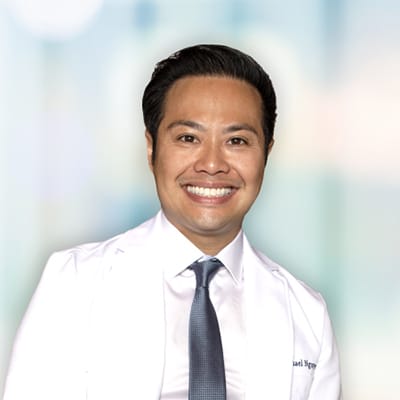Varicose Veins and Vein Disease
Everyone has achy legs and feet from time to time. When you are sore after a long day of hiking or a strenuous workout, there is no need to worry. Some extra stretching, application of hot and cold packs, and an over-the-counter pain reliever will get you back on your feet in a day or two.
However, if you have on-going achiness with no obvious cause, especially when varicose veins are also present, it could be time to see a vein doctor in New York or vein doctor in New Jersey. These symptoms can signal serious vein diseases like blood clots or Chronic Venous insufficiency (CVI).
Take this quick quiz to determine whether it’s time to schedule an appointment with your vein specialist.

Which of the Following Describes Your Symptoms?
A: Occasional tired, achy feet and legs after an unusual amount of activity. After a few days, you are back to normal.
B: Swelling in your legs, ankles, and feet when sitting or standing for an unusual amount of time – for example, a long car or plane ride. As soon as the trip is over and you start moving around, the swelling goes away.
C: An occasional “charley horse” cramp in your leg. It lasts for a few seconds, and then it is months or years before you have another one.
D: Swelling, achiness, heaviness, or numbness in your legs more often than not. Putting your feet up helps, but the problem returns the next day.
E: Frequent leg cramps, especially at night. They come on suddenly and unpredictably – and they don’t seem to be associated with anything you are doing during the day.
If you answered A, B, or C, you probably don’t need to see a vein doctor. Unfortunately, occasional swelling and discomfort in your legs, ankles, and feet is unavoidable.
If you answered D or E, even if you do not have varicose veins or spider veins, you could be experiencing the early signs and symptoms of vein disease. It is worth scheduling an appointment with your vein doctor in NY or vein doctor in NJ for an accurate diagnosis.

Which of the Following Best Describes Your Varicose Veins and Spider Veins?
A: Raised blue or purplish vessels with a thick, ropelike appearance on your legs or knees.
B: A network or web of thin red, blue, or purple veins just beneath the surface of your skin.
C: Bulging veins in your arms or hands.
D: Protruding veins on the buttocks or around the genitals.
Varicose veins and spider veins occur when tiny valves in the vessels become damaged. In healthy veins, the valves open to allow blood to flow through, then close to prevent it from leaking backwards.
When the valves aren’t working properly, blood collects in the lower half of your body. The extra blood creates pressure on the vessel walls, and they start to swell. The enlarged veins become visible through the skin as either spider veins or varicose veins.
Whether you answered A, B, C, or D, a visit to your spider vein doctor or varicose vein doctor is a smart decision. Though any of these issues can develop without an underlying vein disease, a vein specialist should do a quick exam to rule out serious venous disorders.
What Does Your Family History Tell You?
A: No one (that you are aware of) has been diagnosed with vein disease, and family members have not experienced issues with varicose veins and spider veins.
B: Some of the women in your family have had occasional issues with varicose veins during pregnancy.
C: One or more of your close relatives has been diagnosed with vein disease or – even without an actual diagnosis – has mentioned problems with circulation in the lower part of the body and/or issues with varicose veins and spider veins.
If you answered A, you are fortunate. Vein disease has a strong genetic link, so no family history of venous disorders puts you at lower risk for developing this condition.
If you answered B, you may be at higher risk for varicose veins and spider veins, particularly during pregnancy. However, protruding veins during this time are quite common. They don’t necessarily signal a serious underlying condition. During pregnancy, the growing baby puts extra pressure on the veins. When the baby is delivered, the pressure is relieved, and varicose veins often go away without treatment.
If you develop varicose veins or spider veins while you are pregnant, monitor your symptoms and try at-home remedies like compression stockings to manage the problem. See a vein doctor if you are experiencing significant discomfort, or the varicose veins and spider veins don’t disappear within a few months of delivering your baby.
If you answered C, take careful note of any symptoms you experience. See a vein specialist if you notice signs of vein issues, because you are at higher risk. Of course, higher risk doesn’t mean you will definitely have vein disease.
How Would You Describe Your Level of Activity?
A: You are up and about for most of the day, and you spend a lot of time moving around.
B: You have a relatively sedentary job, but you take frequent breaks. Your evenings include lively activities that keep you moving.
C: Your job requires long periods of sitting or standing, and you rarely get breaks. You spend off-hours relaxing in front of the TV.
If you answered A or B, you are probably moving enough to keep your veins healthy. Unfortunately, those who have a more sedentary lifestyle like the one described in option C aren’t so lucky. Too much time sitting or standing increases your risk of vein disease.
What Do You Have to Lose?
It can be tempting to avoid the time and expense of visiting a spider vein clinic or varicose vein clinic if you don’t have severe discomfort. However, a small investment of time and money when you first notice signs of vein disease will pay off in the long run.
The sooner vein disease is diagnosed and treated, the easier it is to get the condition under control. You are less likely to face a permanent side effect like discoloration of your skin, and you won’t have to go through the pain that most people experience as untreated vein disease progresses.
No matter how you answered the question “Which of the following best describes your varicose veins?”, there are options for reducing or eliminating bulging blood vessels. The Board-Certified specialists at the Vein Treatment Clinic have the education and experience necessary to correctly identify the underlying cause of your symptoms. They are experts when it comes to recommending the best vein treatment for your particular situation, and they perform these state-of-the-art procedures on-site. Most treatments take less than an hour, and you can get back to your normal activities right away.
These are just a few of the cutting-edge vein treatments available today:
- Sсlеrоthеrару – Uses a medical injection to close varicose veins
- VenaSeal – Seals diseased veins with a medical adhesive
- Radiofrequency Ablаtіоn (RFA) – Relies on thermal energy to close unhealthy veins
- Endоvеnоuѕ Lаѕеr Ablаtіоn (EVLA) – Applies targeted laser energy to close unhealthy veins
- Clarivein – Uses an advanced tool to administer medication for closing varicose veins
- Varithena – Uses a medical foam to close varicose veins
Vein disease impacts millions of Americans every year, but it often goes un-diagnosed. Don’t risk your long-term health and well-being to save a few dollars. If you are experiencing the signs and symptoms of vein disease, schedule a consultation today. 96% of vein treatments are covered by all major medical insurances and Medicare.







